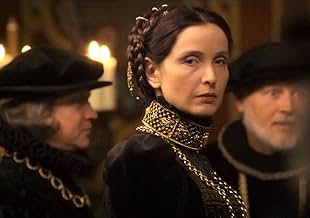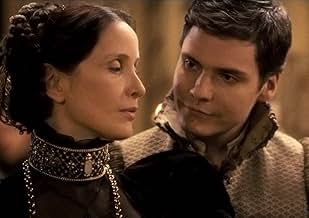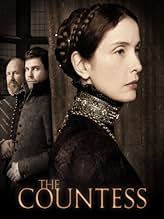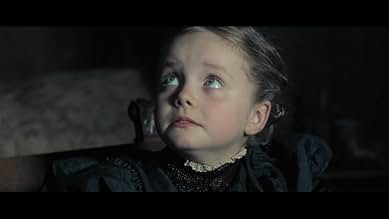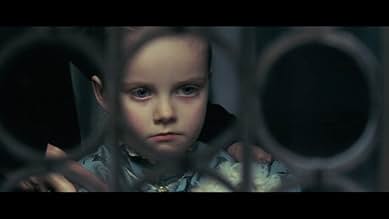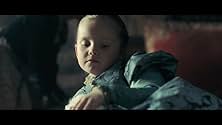IMDb-BEWERTUNG
6,2/10
8855
IHRE BEWERTUNG
Eine ungarische Gräfin aus dem 17. Jahrhundert begibt sich auf ein mörderisches Unterfangen, in der Überzeugung, dass das Baden im Blut von Jungfrauen ihre Schönheit bewahren wird.Eine ungarische Gräfin aus dem 17. Jahrhundert begibt sich auf ein mörderisches Unterfangen, in der Überzeugung, dass das Baden im Blut von Jungfrauen ihre Schönheit bewahren wird.Eine ungarische Gräfin aus dem 17. Jahrhundert begibt sich auf ein mörderisches Unterfangen, in der Überzeugung, dass das Baden im Blut von Jungfrauen ihre Schönheit bewahren wird.
- Auszeichnungen
- 1 Gewinn & 1 Nominierung insgesamt
Andy Gätjen
- Miklos
- (as Andy Gatjen)
Empfohlene Bewertungen
Well, actually, in the Little Carpathians, apparently, which are not part of Transylvania, or so Wikipedia tells me.
I really enjoyed this film (at home on pay-per-view)though I think it is intended for a pretty narrow audience. As others have noted, the dialogue is amazingly stilted (very literary, rather like a French novel of the 17th or 18th century) and delivered in near-monotone. I kept feeling that the whole movie had been dubbed into English. On the other hand, I found the acting very fine, and I admired the insistence on presenting these characters as not at all like you, me, or the folks in the latest TV drama. The Countess in particular is a strange, unique portrait--her piety, her desire for amorous adventure, her pride, her intelligence. And that's before you get to the blood-of-virgins part.
The film proposes that what we are seeing before our eyes is not the truth about the Countess. We are watching a fantasy of a noblewoman enacting a tale "told by the victors"--by the men who were enriched by her downfall and relieved, too, to be rid of the very possibility of an intelligent woman. The tale is told, too, by the peasants and others whose sons are fighting in her army. Yet the man who questions the gory story is her lover, and he too may be deceived. There is no simple answer to the question, what really happened?--no resolution.
In short, it's an intellectual (and visual) treat, but it won't affect your blood sugar.
I really enjoyed this film (at home on pay-per-view)though I think it is intended for a pretty narrow audience. As others have noted, the dialogue is amazingly stilted (very literary, rather like a French novel of the 17th or 18th century) and delivered in near-monotone. I kept feeling that the whole movie had been dubbed into English. On the other hand, I found the acting very fine, and I admired the insistence on presenting these characters as not at all like you, me, or the folks in the latest TV drama. The Countess in particular is a strange, unique portrait--her piety, her desire for amorous adventure, her pride, her intelligence. And that's before you get to the blood-of-virgins part.
The film proposes that what we are seeing before our eyes is not the truth about the Countess. We are watching a fantasy of a noblewoman enacting a tale "told by the victors"--by the men who were enriched by her downfall and relieved, too, to be rid of the very possibility of an intelligent woman. The tale is told, too, by the peasants and others whose sons are fighting in her army. Yet the man who questions the gory story is her lover, and he too may be deceived. There is no simple answer to the question, what really happened?--no resolution.
In short, it's an intellectual (and visual) treat, but it won't affect your blood sugar.
I really wanted to like this. Based on the true story of 17th century Countess Bathory, who grew obsessed with retaining her youth, and decided the best way to do this was by bathing in the blood of virgins. What could have been a disturbing descent into madness turns out to be a dull by the numbers bio-pic/period piece.
Julie Delpy does an alright job in the titular role, but the departure from her usual romantic roles doesn't really work, as Delpy just seems like she's on auto-pilot throughout most of the film. The script, written by Delpy, treats the Countess as some sort of feminist pioneer, and at other times, shows her to be a monster. The movie wants to have it both ways, but in the end it it just seems really confused and tiresome.
Julie Delpy does an alright job in the titular role, but the departure from her usual romantic roles doesn't really work, as Delpy just seems like she's on auto-pilot throughout most of the film. The script, written by Delpy, treats the Countess as some sort of feminist pioneer, and at other times, shows her to be a monster. The movie wants to have it both ways, but in the end it it just seems really confused and tiresome.
I haven't seen the film yet, I was thinking of seeing it this week, but given some of the things I've read in the reviews, I may not bother. The story recounted in the film is NOT a true story at all. Countess Elizabeth Bathory existed and she was indeed charged with a number of supposed murders, but the charges were never properly proved. In fact no evidence was properly presented - her 'trial' was a politically motivated set-up. She was an extremely rich and powerful woman living at a time when in most societies, but especially Eastern European ones, wealthy and powerful women were hugely resented by their male counterparts.
Once she was widowed Countess Bathory chose not to remarry as she did not want another man to take control of her lands. She wanted to rule her estates herself - and she was a very capable ruler. Unfortunately powerful men in Hungary (and the Austro-Hungarian Empire) were greedy for her lands. They could not dispossess her legally, so they hatched a plot to have her charged with terrible crimes. Her servants were tortured and forced to accuse her, however, no credible evidence was ever presented. It was enough however, for her lands to be confiscated.
As for punishment, she was NOT bricked up in a room and fed through a hole in the wall. That is fantasy. She was confined to a few rooms in one of her castles, a kind of house arrest. Sadly films like this perpetuate the myth and falsehoods about a woman who, although tough and sometimes hard on her servants, was never guilty of the horrendous crimes of which she has been accused. I am so sick and tired of seeing history re-written and fabricated that I probably won't go and see it now - and I would warn anyone who thinks they are going to see something 'historical' that it just isn't.
Once she was widowed Countess Bathory chose not to remarry as she did not want another man to take control of her lands. She wanted to rule her estates herself - and she was a very capable ruler. Unfortunately powerful men in Hungary (and the Austro-Hungarian Empire) were greedy for her lands. They could not dispossess her legally, so they hatched a plot to have her charged with terrible crimes. Her servants were tortured and forced to accuse her, however, no credible evidence was ever presented. It was enough however, for her lands to be confiscated.
As for punishment, she was NOT bricked up in a room and fed through a hole in the wall. That is fantasy. She was confined to a few rooms in one of her castles, a kind of house arrest. Sadly films like this perpetuate the myth and falsehoods about a woman who, although tough and sometimes hard on her servants, was never guilty of the horrendous crimes of which she has been accused. I am so sick and tired of seeing history re-written and fabricated that I probably won't go and see it now - and I would warn anyone who thinks they are going to see something 'historical' that it just isn't.
this is very well made, true to the history, geography and atmosphere of the place where the story takes place. also very well played, esp by Julie Delpy who already is known for her convincing but modest acting. Costumes and art decoration were superior. The story was told well too, considering it's telling a rather controversial story and that the main character is an anti-hero.Still it's very successful in reflecting the controversies in history telling and discussions about historians, heroes and storytellers by saying they're the real devil. Watch it definitely and compare it to other historic movies, you'll sense the difference...
Film lovers and connoisseurs looking for a significant example of an auteur film from the first decade of the 3rd millennium can choose 'The Countess' without hesitation. Made in 2009 as a Franco-German co-production with international distribution, the film is written and directed by Julie Delpy, who also plays the title role. On top of that, she is also a co-producer and the composer of the film's music. The screenplay picks up a story that has already been told in dozens of books and films that adapt those books or invent original versions - the story of the bloody Countess Elisabeth (Erzsébet) Báthori, alleged serial killer and mother of all the heroes and heroines of 'Gothic' horror books and of vampire movies. She was a genuine character from Hungarian history of the 16th and 17th centuries, a woman whose real life has long been amplified and distorted by the legends built around her. Screenwriter Julie Delpy's version questions the historical accounts and the legends developed around them and focuses on the heroine's evolution and the origin of the deeds attributed to her. Without denying them, the story we see on the screen proposes a reading in a feminist key, in the political context of Central Europe of that historical period, superimposed on an unfortunate love story.
Erzsébet Báthori - whose name is spelled out in the film as Erzebet - is born in the 16th century in a small Hungary, which was desperately struggling to survive on the map of Europe. It is also a time of witches and of the Inquisition and an era in which women have few rights, even if they belong to the nobility. Destined from birth to a forced marriage, the heroine of the film goes through a childhood traumatized by violence followed by adolescence in which an unexpected pregnancy ends with the death penalty in terrible tortures of the lover (a boy from the peasants class). The husband is one of Hungary's great warriors, and upon his death (possibly poisoned by the king who owed him considerable fortunes, it is suggested) the countess takes over the husband's affairs with no intention of remarrying, as social conventions required. A love affair with a nobleman 18 years her junior has no chance, as he belongs to the Thurzo family, the Báthori clan's competitors in dominating what was left of Hungary. Erzsébet blames the failure of the relationship on the age difference, and is ready to do anything to erase it. A random incident makes her believe that the blood of young women, necessarily virgins, can at least physically restore the appearance of youth. Is it her decision, is this about a personality warped to murder, or because the encouragement she received from her enemies? Doom is inevitable, but is she alone responsible? Hell has many nuances, the director and screenwriter seems to say.
Julie Delpy tries to keep the balance between horror cinema and feminist drama, both in historical context. Scenes depicting the brutality and violence of the era are sprinkled throughout the film and generally consist of very brief flashes of seconds or less. Without denying the crimes attributed to the heroine, Julie Delpy avoids some details that have become common in legends (such as the bloodbaths) and questions the judgment applied to the heroine by contemporaries and history. She does it, unfortunately, using voice-over, a procedure that I like less and which seems to me unjustified considering the talent of the director in visually creating the relationships between the characters and reconstructing the era in its spirit and not necessarily in details . The team of actors is select. Delpy casts herself in the copious lead role, one of the best of her career. William Hurt as Thurzo the father is charismatic as always and Daniel Brühl is a perfect fit as the son. In my opinion, however, the most memorable role belongs to Anamaria Marinca, who embodies Darvulia - the servant, confidante, mistress and the only being who seems to have true and steadfast feelings for Erzsébet. The balance between romance, horror and drama is successful, perhaps a little too successful, and therefore the film gives the impression (and has been criticized) of a certain coolness. I personally liked this middle ground solution, which makes this version of Countess Báthori's story avoid cinematographic genre categorizations and let the audience decide.
Erzsébet Báthori - whose name is spelled out in the film as Erzebet - is born in the 16th century in a small Hungary, which was desperately struggling to survive on the map of Europe. It is also a time of witches and of the Inquisition and an era in which women have few rights, even if they belong to the nobility. Destined from birth to a forced marriage, the heroine of the film goes through a childhood traumatized by violence followed by adolescence in which an unexpected pregnancy ends with the death penalty in terrible tortures of the lover (a boy from the peasants class). The husband is one of Hungary's great warriors, and upon his death (possibly poisoned by the king who owed him considerable fortunes, it is suggested) the countess takes over the husband's affairs with no intention of remarrying, as social conventions required. A love affair with a nobleman 18 years her junior has no chance, as he belongs to the Thurzo family, the Báthori clan's competitors in dominating what was left of Hungary. Erzsébet blames the failure of the relationship on the age difference, and is ready to do anything to erase it. A random incident makes her believe that the blood of young women, necessarily virgins, can at least physically restore the appearance of youth. Is it her decision, is this about a personality warped to murder, or because the encouragement she received from her enemies? Doom is inevitable, but is she alone responsible? Hell has many nuances, the director and screenwriter seems to say.
Julie Delpy tries to keep the balance between horror cinema and feminist drama, both in historical context. Scenes depicting the brutality and violence of the era are sprinkled throughout the film and generally consist of very brief flashes of seconds or less. Without denying the crimes attributed to the heroine, Julie Delpy avoids some details that have become common in legends (such as the bloodbaths) and questions the judgment applied to the heroine by contemporaries and history. She does it, unfortunately, using voice-over, a procedure that I like less and which seems to me unjustified considering the talent of the director in visually creating the relationships between the characters and reconstructing the era in its spirit and not necessarily in details . The team of actors is select. Delpy casts herself in the copious lead role, one of the best of her career. William Hurt as Thurzo the father is charismatic as always and Daniel Brühl is a perfect fit as the son. In my opinion, however, the most memorable role belongs to Anamaria Marinca, who embodies Darvulia - the servant, confidante, mistress and the only being who seems to have true and steadfast feelings for Erzsébet. The balance between romance, horror and drama is successful, perhaps a little too successful, and therefore the film gives the impression (and has been criticized) of a certain coolness. I personally liked this middle ground solution, which makes this version of Countess Báthori's story avoid cinematographic genre categorizations and let the audience decide.
Wusstest du schon
- WissenswertesThe real Elizabeth Báthory has been speculated (such as by author Raymond T. McNally) as being Bram Stoker's main influence for his famous character Dracula, rather than or along with the real Vlad Tepes. Nosferatu, eine Symphonie des Grauens (1922) (an unofficial adaptation of "Dracula") was filmed at Báthory's historical resident and later prison, the Cachtice Castle, which appears in its final shot.
- PatzerAt about 1h15m, the fifth book on the shelf is the "Dictionnaire De Boyer". Abel Boyer did write a French-English dictionary, but he was born in 1664 and Countess Báthory died in 1614.
- Zitate
Gyorgy Thurzo: Love is a myth, to keep the minds of young peasants and virgins occupied with a dream.
- VerbindungenVersion of Der Vampir von Notre Dame (1957)
- SoundtracksCouranta VI
Solinger Streichquartett
Written by Isaak Pesch
From the album "Telemusik"
© & ® Peter Lamprecht
Courtesy of Solinger Streichquartett/Peter Lamprecht
Top-Auswahl
Melde dich zum Bewerten an und greife auf die Watchlist für personalisierte Empfehlungen zu.
- How long is The Countess?Powered by Alexa
Details
- Erscheinungsdatum
- Herkunftsländer
- Offizielle Standorte
- Sprachen
- Auch bekannt als
- The Countess
- Drehorte
- Burg Kriebstein, Kriebstein, Saxony, Deutschland(exteriors: Countess Bathory's castle)
- Produktionsfirmen
- Weitere beteiligte Unternehmen bei IMDbPro anzeigen
Box Office
- Budget
- 5.700.000 € (geschätzt)
- Weltweiter Bruttoertrag
- 784.522 $
- Laufzeit1 Stunde 38 Minuten
- Farbe
- Sound-Mix
- Seitenverhältnis
- 2.35 : 1
Zu dieser Seite beitragen
Bearbeitung vorschlagen oder fehlenden Inhalt hinzufügen


